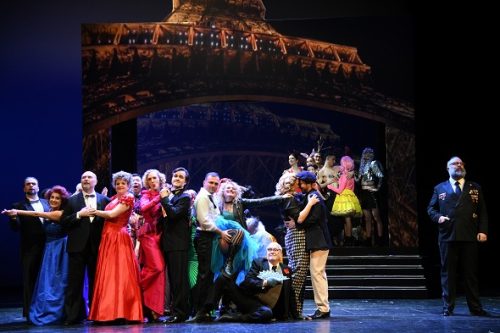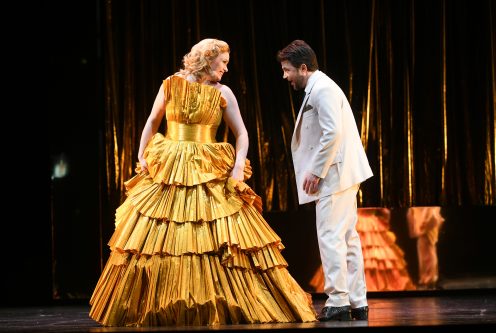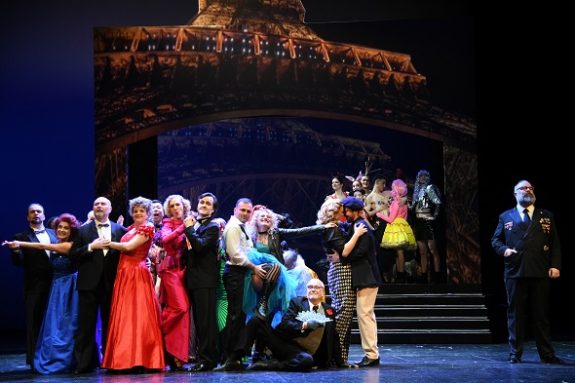 Germany Lehár, The Merry Widow: Soloists, Ballet and Chorus of Stadttheater Bremerhaven, Philharmonic Orchestra Bremerhaven / Hartmut Brüsch (conductor). Stadttheater Bremerhaven, 3.2.2024. (DMD)
Germany Lehár, The Merry Widow: Soloists, Ballet and Chorus of Stadttheater Bremerhaven, Philharmonic Orchestra Bremerhaven / Hartmut Brüsch (conductor). Stadttheater Bremerhaven, 3.2.2024. (DMD)

Production:
Director – Isabel Hindersin
Set and Costumes – Tanja Hofmann
Choreography – Rosemary Neri-Calheiros
Lighting – Frauke Richter
Dramaturgy – Markus Tatzig
Chorus director – Mario El Fakih Hernández
Cast:
Hanna Glawari – Signe Heiberg
Graf Danilo Danilowitsch – Konstantinos Klironomo
Baron Mirko Zeta – Ulrich Burdack
Valencienne – Victoria Kunze
Camille de Rosillon – Andrew Irwin
Njegus – Hans Neblung
Vicomte Cascada – James Bobby
Raoul de St. Brioche – MacKenzie Gallinger
Bogdanowitsch – Patrick Ruyters
Sylviane – Kathrin Verena Bücher
Kromow – Róbert Tóth
Olga – Iris Wemme-Baranowski
Pritschitsch – Daniel Dimitrov
Praskowia – Yvonne Blunk
As the musicians of Bremerhaven Philharmonic Orchestra warmed up for The Merry Widow there were cheerful, relaxed smiles on their faces. They were clearly looking forward to their work, and with good reason: their conductor, Hartmut Brüsch, took them on an exciting journey, and they followed him gladly. They had great fun, in the best sense of artistic achievement, as did the performers on stage and the audience, to judge by the cheers and standing ovations at the end. The production was directed by Isabel Hindersin. She has worked as an actor, sung and directed opera and teaches music theatre at the University of the Arts in Berlin; this range of expertise was reflected in the straightforward storytelling which brought out the best of all involved. The spoken German dialogue sounded genuine and thoroughly rehearsed, although German is not the native language of many of the cast members.
There was much appropriate movement, enlivened by the involvement of members of the ballet company. The choreography by Rosemary Neri-Calheiros was elegantly in line with the music. The set by Tanja Hofmann was imaginative – the slightly worn-looking pillars of the embassy turned into huge sheets of mirroring metal for the second act – with the added special effect, visible at least from my seat, of allowing for a view of the conductor reflected in the bottom panels of that wall. For Act III, part of the set represented the beautifully lit Eiffel Tower against a starry sky. Hofmann also designed the costumes – the Pontevedro diplomats appeared in attire that was grand enough for the occasion, while Hanna Glawari was clearly allowed to splurge on her costumes and ballgown. The lighting design by Frauke Richter supported the production well, particularly by projections of newspaper headlines of Danilo’s betrayal at the start onto a screen and an impressive mood created by two large lights illuminating the stage from the back, thankfully without blinding the audience.
The production was characterised by its pace, liveliness and many genuinely funny moments, resisting any tendency towards sentimentality. The same is true for the music. Brüsch conducted with genuinely felt, meticulously executed and entirely unsentimental love for the music – both its lively, robust, energetic, driven and driving, dashing, racy sections, and the lightweight, floating, sensitive, imaginative, tender and melancholic material, in equal measure. How much more beautiful Lehár’s music is in such a reading, reaching depths far beyond the sentimentality often associated with operetta. Brüsch guided the orchestra’s music-making, the singers, chorus, dancers extras, allowing each to make their impact while achieving unison.

Signe Heiberg sang Hanna Glawari. She is a brilliant actor, attentive to the nuances of the character – exuberant, down to earth, direct in what she thinks and speaks. You tend to believe that she has indeed already spent her vast inherited fortune. Glawari is a further role debut for Heiberg, closely following Tosca und Rusalka earlier this season. It was striking to hear the ways she uses and moulds her voice to suit this new character. Her approach of exposed notes is controlled, but not overly so. She always allows her voice to sound free, resounding with – almost within – the orchestra, not struggling against it. Konstantinos Klironomos was very convincing as Count Danilo. He clearly enjoyed the comedy the production gave his character. Compared with his Cavaradossi and the Prince in Rusalka earlier this season, he showed much improved strength in the lower register of his voice, which he allowed to form the natural basis of higher notes without sounding baritonal. Victoria Kunze as Valencienne reminded us why she has been an audience favourite since she joined the company in Bremerhaven in 2018. Her enjoyment of her art is vibrant every moment she is on stage, her acting is delightful, and her voice is agile across the range, with particularly impressive high notes.
It was rewarding to hear Andrew Irwin in a more exposed role as Camille de Rosillon. His tenor has developed considerably since his Bremerhaven Pedrillo in Die Entführung aus dem Serail (2021), expanding from character tenor to lyric tenor. Ulrich Burdack as Baron Zeta is a great comic actor and impressed us with the engaging musicality of his singing. Actor, singer and author Hans Neblung has been collaborating with the Stadttheater Bremerhaven since 1997, returning regularly from an international career. On this occasion he played Njegus, predominantly a speaking part. He introduced and closed the performance with a recitation of the German folk ballad Es waren zwei Königskinder (Once there were two royal children). The chorus members, especially those with solo parts, gave their all to their acting and singing, and the ballet dancers added flair to the production.
Daniel Meyer-Dinkgräfe
